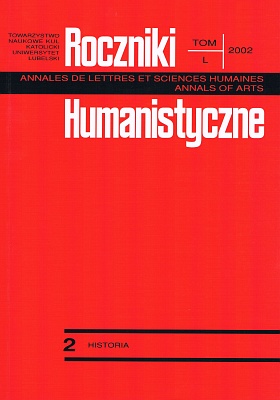The Warsaw Uprising in the Light of Polish Historiography of the Years 1953-1956
Abstract
In the years 1953-1956 Polish historians and journalists often took up the issue of the Warsaw Uprising. Controversies and polemics connected with the problem were going on in Poland rather than in the emigration circles. It would seem that four years are a short period of time, but inner caesuras were able to form then, which were characterized by different points of view on and different ways of writing about the Uprising. These divisions were clearly seen in writings inside Poland only. Social and political transformations that happened in Poland in 1956 and that culminated in the October of that year, played an important role here. The emigration historiography did not experience such sudden changes in the way of writing or evaluating certain phenomena. From the beginning freedom of expressing one's thoughts prevailed there; the standpoints differed from one another and `the only correct' interpretation of historical events was not obligatory.
A sudden change in the style of writing about the fights in the Polish capital that occurred in 1956 is a characteristic feature of historiography devoted to the Uprising. Before that date historians mainly studied the genesis of the event as well as the political and military motives that led the Home Army commanders to giving the order to start the Uprising, and these analyses were mainly made by the regime historians. However, after the 1956 changes a matter-of-fact analysis of the course of the Warsaw fights took over, and the question of its genesis takes up proportionally less space. The works of that time (Borkiewicz) are characterized by objective and many-sided approach to the problem as well as use of a broad range of sources.
In emigration historiography the circles related to the Home Army, people who took part in the Uprising (T. Bór-Komorowski, T. Pełczyński) defend their positions concerning the proper date of starting the Uprising and the need of doing so, using rational arguments, refuting the charges formulated in the literature written inside Poland and basing on reliable sources. However, there are also contrary opinions that are opposed to the idea of uprising, which point to its uselessness (J. Giertych).
Most publications of the years 1953-1956 concerning the problem were written in Poland. Historians and journalists with clearly leftist views wrote for immediate political and propagandist needs. They often use malicious invectives, slanders, emotional terms. Such historians should be mentioned here as Turlejska, Weber and Okęcki, and the journalists and writers, who were, so to say, `on duty': Koźniewski, Przymanowski and Małcużyński.
Another issue is interpretation of the sources. The same ones were often used for proving contrary theses. It must be stated that in the years 1953-1956 the sources were interpreted quite freely in literature written inside Poland; they were often quoted in fragments, choosing the parts favourable for one's theses (Turlejska, Koźniewski, Weber, Małcużyński, Okęcki). True and imaginary information was mixed together and it was interpreted in a free way, which might give the impression of historical objectivism.
Summing up, one may say that a number of issues connected with the topic `the Warsaw Uprising' were shown in Polish historiography of 1953-1956 in different ways, and the particular way depended mainly on what political circles the authors belonged to. Up to 1956 publications that criticised or even condemning the uprising and the Home Army prevailed. At different times different problems were emphasized, and the heroism of the Warsaw soldiers served as a basis for the Polish Communist authorities' propaganda and political games; on the other hand it was an example of utmost sacrifice for the emigration circles.
References
Bartoszewski W., 63 dni, „Świat” 1956, nr 41, s. 16-17.
Borkiewicz A., Powstanie Warszawskie 1944, „Kierunki” 1956, nr11, s. 5-7; nr 12, s. 6-7; nr 13, s. 5; nr 14, s. 11; nr 15, s. 9; nr 16, s. 9; nr 17, s. 8; nr 18, s. 9, 11; nr 19, s. 9; nr 20, s. 10; nr 21, s. 9, 11.
Borkiewicz A., Powstanie Warszawskie 1944. Zarys działań natury wojskowej, Warszawa 1957.
Bór-Komorowski T., Armia Podziemna, Warszawa 1994.
Bór-Komorowski T., Kraj a Rosja Sowiecka, „Życie” 1954, nr 40, s.1.
Ciechanowski J. M., Powstanie warszawskie. Zarys podłoża politycznego i dyplomatycznego, Warszawa 1984.
Giertych J., Po wypadkach poznańskich. Na alarm! List otwarty do polskiej emigracji przestrzegający przed grożącym Polsce niebezpieczeństwem, Londyn 1956.
K.M., Bohaterska karta, „Polska” 1955, nr 7, s. 14-15.
Koźniewski K., Dlaczego?, „Dookoła Świata” 1954, nr 40, s. 4-5.
Małcużyński K., Zanim zapłonęła Warszawa. Fakty i dokumenty o powstaniu warszawskim, Warszawa 1955.
Okęcki S., Powstanie warszawskie w świetle analizy położenia operacyjnego na froncie radziecko-niemieckim, w: Studia i materiały do historii sztuki wojennej, t. I, Warszawa 1954, s. 75-103.
Okęcki S., W X rocznicę wyzwolenia prawobrzeżnej Warszawy, „Trybuna Ludu” 1954, nr 266, s.3.
Pełczyński T., O Powstaniu Warszawskim, „Bellona” 1955, nr 3, s.3-16.
Polskie Siły Zbrojne w II wojnie światowej, t. III: Armia Krajowa, Londyn 1950.
Przymanowski J., Bohaterstwo i zdrada, „Żołnierz Polski” 1954, nr17, s.1-2.
Weber A., Turlejska M., W dziesięciolecie powstania warszawskiego, „Nowe Drogi” 1954, nr 8, s.54-77.
Werfel E., W pożodze sierpnia, „Świat” 1954, nr 31, s. 6-7.
Wysokiński E., Wyzwolenie Warszawy, Warszawa 1955.
Zawodny J. K., Powstanie Warszawskie w walce i dyplomacji, Warszawa 1994.
Żenczykowski T., Samotny bój Warszawy, Lublin−Paryż 1990.
Copyright (c) 2002 Roczniki Humanistyczne

This work is licensed under a Creative Commons Attribution-NonCommercial-NoDerivatives 4.0 International License.





